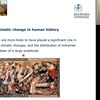respectively
Exploiting Temporal Network Structures of Human Interaction to Effectively Immunize Populations
2012. PLoS ONE 7, e36439. AbstractDecreasing the number of people who must be vaccinated to immunize a community against an infectious disease could both save resources and decrease outbreak sizes. A k
Dunbar’s number deconstructed
Biology Letters 17: 20210158 Abstract A widespread and popular belief posits that humans possess a cognitive capacity that is limited to keeping track of and maintaining stable relationships with approxi
D3.2 Guidelines for the development and the use of SIS
De Montfort University Abstract This report contains two sets of ethical guidelines – one for the technological development and one for the use – of artificial intelligence and big data systems, a gloss
Socioeconomic Persistence Across Generations: Cognitive and Noncognitive Processes
Kapitel 3. http://www.russellsage.org/publications/parents-to-children Abstract This chapter analyses the role of cognitive ability, personality traits, and physical characteristics in transmission of so
Symposium in logic and philosophy
On the 21st of October The Royal Swedish Academy of Sciences will arrange a seminar with and about The Rolf Schock Laureate in logic and philosophy, professor Derek Parfit. Other speakers include Gusta
The Case for Emissions Egalitarianism
Ethical Theory and Moral Practice, vol. 22, no 2., doi.org/10.1007/s10677-019-10016-8 Abstract There is a fixed limit on the greenhouse gas emissions that the atmosphere can absorb before triggering dang

Fredrik Charpentier Ljungqvist: Impacts of past climate variability – lessons for the 21st century
The talk summarizes key findings of state-of-the-art research on how climate variability and change have affected different aspects of human history in medieval and early modern Europe (c. 700–1815 CE
Future of food: A technology-centered path towards sustainable production in 2100
Futures, vol. 167 Abstract We stipulate a normatively desirable scenario for food production in 2100 and formulate a specific technology-centered path to reach it. In this scenario, the human population
The Tyranny of Political Correctness? A Game-Theoretic Model of Social Norms and Implicit Bias
Journal of Applied Philosophy Abstract This article sets out to describe and solve two puzzles that emerge in segregated labour markets (e.g. the USA or Sweden). First, in many hiring contexts people prqualification norm
Completed: Waiting for Life
A minitour with screening of the film "Waiting for Life" and a panel discussion including three former life-sentenced men, two criminologists and a documentary filmmaker will be made in San Fransisco, Washington DC and Stockholm. How can culture and meaningful content change life in prison?








